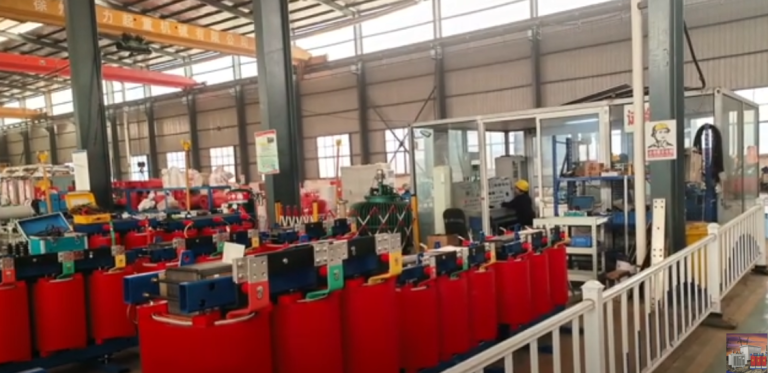მშრალი ტიპის ტრანსფორმატორებში ფისოვანი იზოლაციის გამოყენების უპირატესობები
მშრალი ტიპის ტრანსფორმატორებში ფისოვანი იზოლაცია სულ უფრო პოპულარული გახდა ბოლო წლებში მისი მრავალი უპირატესობის გამო. ფისოვანი იზოლაციის გამოყენების ერთ-ერთი მთავარი უპირატესობა არის მისი უნარი უზრუნველყოს შესანიშნავი დაცვა ტენიანობისა და დამაბინძურებლებისგან. ეს განსაკუთრებით მნიშვნელოვანია მკაცრ გარემოში, სადაც ტრადიციული საიზოლაციო მასალები შეიძლება დროთა განმავლობაში დეგრადირებული იყოს. ეს ნიშნავს, რომ ტრანსფორმატორს შეუძლია იმუშაოს მაღალ ტემპერატურაზე გადახურების ან იზოლაციის დაზიანების რისკის გარეშე. ეს განსაკუთრებით მნიშვნელოვანია იმ აპლიკაციებში, სადაც ტრანსფორმატორი ექვემდებარება სითბოს მაღალ დონეს ან სადაც ხშირია ტემპერატურის მერყეობა.
ფისოვანი იზოლაციის კიდევ ერთი მთავარი უპირატესობა არის მისი უნარი შეამციროს ელექტრული რკალის წარმოქმნის რისკი. რკალი შეიძლება გამოიწვიოს ტრანსფორმატორის სერიოზული დაზიანება და საფრთხე შეუქმნას პერსონალს. ფისოვანი იზოლაციის გამოყენებით მნიშვნელოვნად მცირდება რკალის წარმოქმნის რისკი, რაც იწვევს უფრო საიმედო და უსაფრთხო ტრანსფორმატორს.
| ტიპი | რეიტინგული და nbsp;ტევადობა და nbsp;(KVA) | ძაბვა და nbsp; კომბინაცია(KV) | ჩატვირთვის გარეშე და nbsp;ზარალი(W) | ჩატვირთვა და nbsp;ზარალი(W) | ჩატვირთვის გარეშე და nbsp;მიმდინარე და nbsp;( პროცენტი ) | მოკლე ჩართვა და nbsp; წინაღობა და nbsp;( პროცენტი ) |
| SC13-30 | 30 | 6,6.3,6.6,10,11/0.4 | 150 | 710 | 2.3 | 4.0 |
| SC13-50 | 50 | 6,6.3,6.6,10,11/0.4 | 215 | 1000 | 2.2 | 4.0 |
| SC13-80 | 80 | 6,6.3,6.6,10,11/0.4 | 295 | 1380 | 1.7 | 4.0 |
| SC13-100 | 100 | 6,6.3,6.6,10,11/0.4 | 320 | 1570 | 1.7 | 4.0 |
| SC13-125 | 125 | 6,6.3,6.6,10,11/0.4 | 375 | 1850 | 1.5 | 4.0 |
| SCB13-160 | 160 | 6,6.3,6.6,10,11/0.4 | 430 | 2130 | 1.5 | 4.0 |
| SCB13-200 | 200 | 6,6.3,6.6,10,11/0.4 | 495 | 2530 | 1.3 | 4.0 |
| SCB13-250 | 250 | 6,6.3,6.6,10,11/0.4 | 575 | 2760 | 1.3 | 4.0 |
| SCB13-315 | 315 | 6,6.3,6.6,10,11/0.4 | 705 | 3470 | 1.1 | 4.0 |
| SCB13-400 | 400 | 6,6.3,6.6,10,11/0.4 | 785 | 3990 | 1.1 | 4.0 |
| SCB13-500 | 500 | 6,6.3,6.6,10,11/0.4 | 930 | 4880 | 1.1 | 4.0 |
| SCB13-630 | 630 | 6,6.3,6.6,10,11/0.4 | 1070 | 5880 | 0.9 | 4.0 |
| SCB13-630 | 630 | 6,6.3,6.6,10,11/0.4 | 1040 | 5960 | 0.9 | 6.0 |
| SCB13-800 | 800 | 6,6.3,6.6,10,11/0.4 | 1210 | 6960 | 0.9 | 6.0 |
| SCB13-1000 | 1000 | 6,6.3,6.6,10,11/0.4 | 1410 | 8130 | 0.9 | 6.0 |
| SCB13-1250 | 1250 | 6,6.3,6.6,10,11/0.4 | 1670 | 9690 | 0.9 | 6.0 |
| SCB13-1600 | 1600 | 6,6.3,6.6,10,11/0.4 | 1960 | 11700 | 0.9 | 6.0 |
| SCB13-2000 | 2000 | 6,6.3,6.6,10,11/0.4 | 2440 | 14400 | 0.7 | 6.0 |
| SCB13-2500 | 2500 | 6,6.3,6.6,10,11/0.4 | 2880 | 17100 | 0.7 | 6.0 |
One of the main advantages of resin insulation is its ease of maintenance. Unlike traditional insulation materials, resin insulation does not require regular maintenance or replacement. This can lead to significant cost savings over the lifetime of the transformer, as well as reduced downtime and maintenance requirements.
Resin insulation is also environmentally friendly, as it is non-toxic and does not release harmful chemicals into the environment. This makes it an ideal choice for companies looking to reduce their environmental impact and comply with strict regulations.
In addition to these benefits, resin insulation is also highly customizable. This means that transformers can be designed to meet specific requirements and performance criteria. This flexibility allows for greater efficiency and performance, as well as the ability to tailor the transformer to the needs of the application.
Overall, resin insulation offers a wide range of benefits for Dry type transformers. From superior protection against moisture and contaminants to excellent thermal stability and resistance to arcing, resin insulation is a reliable and cost-effective solution for a variety of applications. Its ease of maintenance, environmental friendliness, and customization options make it an ideal choice for companies looking to improve the performance and reliability of their transformers.



